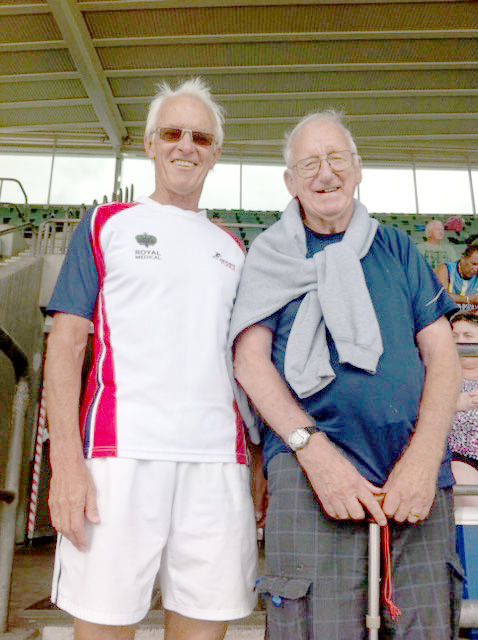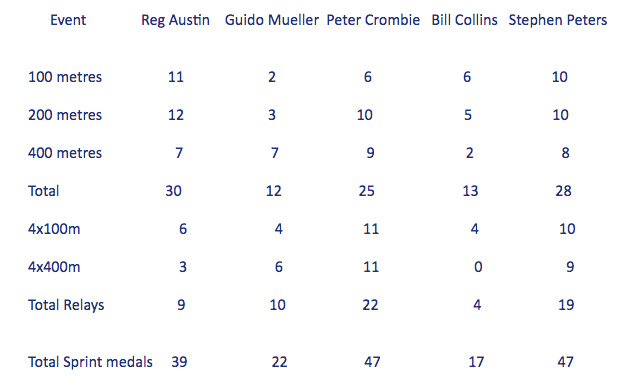Best WAVA/WMA guy sprinters of all time? Medal tally reveals a tie
Here’s what Amanda graciously shared:
A World Championship often brings out the “best of the best” and Perth was no exception, with many fine displays of athlete ability across all age groups. I guess that is the beauty of age-graded tables. They offer a means to compare our performances as we age regardless of where we finish.
Another way that we can measure success is by world records, and others would argue that the number of medals represents longevity of success in our sport.
For those readers who love to pontificate over results, a tally of outdoor world men’s sprint individual and relay medals has been prepared.
Peter Crombie AUS 47
Stephen Peters GB 47
Reg Austin AU 39
Guido Mueller GER 22
Steve Robbins USA 21
Bill Collins USA 21What is apparent is that Australia’s sprint legend the late Reg Austin has to date won more 100m and 200m sprint medals than any other male in history — 11 in the 100 and 12 in the 200. The 2010 Male WMA of the Year Peter Crombie has won more 400-meter medals than any other male with 9.
Peter Crombie has also won more world relay medals in both the 4×100 and 4×400 than any other male athlete in history with 22 ahead of Britain’s Stephen Peters with 19.
Australia’s Peter Crombie and Stephen Peters both have 47 world medals — an incredible feat of performance and longevity in anyone’s language.
Peter Crombie, known to many in the U.S. as a regular competitor at the U.S. championships, won all five gold sprint medals on offer at the recent World Championships in Perth, Australia – 100, 200, 400, 4×100 and 4×400 relays. He was the only person at this meet to achieve that level of performance. It is worth noting that this incredible feat has only been achieved seven times in the history of WMA Championships since 1975.
Stephen Peters is the only male athlete to achieve this in sprints and relays four times, in 2003, 2005, 2009 and 2013. Three times WMA Male Athlete of the Year, Germany’s Guido Mueller, has done this twice, once in 2009 and also in 2015.
As for triple individual gold, apart from those mentioned above, Bill Collins has achieved this twice in 2001 and 2007, Reg Austin in 1987 and 1991, Steve Robbins in 1995 and Stephen Peters in 2015.
It appears if you have Stephen or Peter(s) in your name it helps!
It is apparent that these six men represent the cream of world masters sprinting over many decades, and it will be interesting to see how they add to their tallies in the coming years and who is able to break world records as they move into a new age group.
Guido has more medals than this, of course, since he’s won quite a few in the hurdles. (I saw him set the M60 WR for 300, 42.31, at 1999 Gateshead.) He has to be the top sprinter/hurdler of all time.







15 Responses
Interesting! The top medalist of alle disciplines maybe is Olga Kotelko? And what is the total number of all medalists?
I’d love to see WMA name someone to do stats on world stadia championships — indoors and out.
Do we even know WMA meet records in all events and age groups?
Early results are archived at mastershistory.org.
Mastersrankings.com would be an ideal platform for all-time marks. An early effort to create all-time lists at mastersathletics.net ran out of steam.
Excellent statisticians keep national and European lists, but they need to team up for a world all-time list.
That is a list of great master runners and they certainly deserve their ranking! Since masters runners have to pay their own way unlike the elite open runners, not everyone can attend every World meet. I wonder how much that affects the list?
So many interesting types of stats that could be collected for the various events…like the greatest number of World Championships in a single event. I’m sure Carol Finsrud could claim some honors there in the throws and Bruce McBarnette in the high jump. Weia, you probably are somewhere at the top in terms of the number of World Championships in the high jump, aren’t you?
Oh no, Rob, I only attend worlds when it is not too far and when a holiday is combinable with the championship. So only 3 outdoor golds and 1 silver, plus 2 indoor golds.
Michael Walker (no. 3):
Yes, I agree with your apparent conclusion that we cannot automatically make this list of six = the six greatest. As you know, the overwhelming majority of active masters athletes do not attend worlds.
This past summer we had a disappointing turnout at our outdoor nationals (in Allendale, Michigan), and the lack of good numbers was blamed in part on Perth worlds. Still, here is an interesting comparison for you:
Our outdoor nationals managed to scrape together 219 men and women in the 100-meter dash (entrants, that is). Later on in the year, we drew 244 US entrants for Perth worlds.
I am not talking 100 dash only; I mean sprinters, middle-distance runners, distance runners, race walkers, throwers, vertical jumpers,
horizontal jumpers, and multi-eventers. In addition, Michael, many of the USA Perth entrants competed in our outdoor nationals.
Bob Lida, Willie Gault, and Payton Jordan are three names that come readily to mind among the many great US male sprinters who are not on the list of six. Two of those names may be mentioned in the same sentence next year, as Lida may challenge Payton Jordan’s M80 marks set 19 long years ago: 14.35 in the 100 and 30.89 in the 200.
When I reach 80 I hope I can break 3 minutes in the 200.
Can’t really speak for the other great stars over the decades, but I do believe Irene Obera would rank high in the pantheon of “greatest female sprinters” based on her world championship medals. I think she was pretty dominant during her heyday (79-99), medaling in 3-5 events (including the 2 relays) in many of those meets.
She failed to win any gold only in 2005 after a brief retirement (but still won 3 that year). Since 2005, she has won 12 sprint medals, eleven of them gold, and 21 overall. I have to believe her overall number of medals is in excess of 40, and last year was the first that she competed in any WMA championship event besides the sprints/relays.
Alan, as you know, our USATF Masters Hall of Fame dates back only to 1996. Thus, the committee for the first class could look back over some 28 years of performances to come up with the honorees.
The committee selected an inaugural class of seven, two of whom were sprinters. To me, the committee’s choices speak very clearly when we assess the pantheon of greats in our first three decades of masters T&F in the U.S.
Oh, who were the two sprinters? Payton Jordan and Irene Obera.
Thanks, Peter! And that’s why we appreciate you commentating at our championship meets — because you’ve been around the block a looong time.
I actually did a quick check and found a table Irene had given me recently. It shows that she has now won 13 world titles at the 100m distance, and 43 sprint medals in all. If you add her recent (last two worlds) medals in non-sprint events, she has won 51 world championship medals overall, 39 gold, in eleven different events. Hopefully we will see her compete again at the world level. Never say never.
This summary which will include Steve Robbins, with 21 medals, is meant to only list the top 6 male sprint medal winners at world titles since their inception in 1977. It makes no attempt to try and determine who are the best sprint athletes of all time only those who actually turn up to world titles and compete. This is a very specific method of determining performance at the top level and over an extended period. In that regard both Peter Crombie and Stephen Peters are obvious standouts.
Other athletes like Payton Jordon, Willie Gault and Bob Lida are brilliant athletes with world records but have not competed at enough world meets to justify inclusion.
The performances of Payton Jordon and even the mighty Reg Austin, were brilliant in their day but are being easily surpassed by subsequent performances at world championship meets.
Despite the stated lack of depth in some events in Perth just like a number of earlier world title meets, the standard in men’s sprints, was in the main, outstanding in Perth.
Amanda sent a new medal chart, including Steve Robbins: http://masterstrack.com/wp-content/uploads/medals.pdf
Thank you, Amanda, for doing all the fine work that you have presented to us. I knew that your statistics were only for WAVA and then WMA championships, but it was the first part of your concluding sentence that prompted me, and perhaps Alan Kolling, to take additional notice and write something:
“It is apparent that these six men represent the cream of world masters sprinting over many decades ….”
With masters/veteran athletics only about five decades old, and using a straightforward interpretation of “the cream,” one could easily conclude that the intent was to say that these were the top six male sprinters in our history.
Thank you, again, Amanda.
The above list may include “the most decorated masters sprinter(s) of all time,” but it certainly does not document the best masters sprinters of all time. Not with the high number (9) of European WAVA/WMA world outdoor championships (77, 79, 85, 91, 99, 05, 07, 09, 15). Even Austria has hosted three (four counting NZ). By comparison, in the last 41 years, the US has hosted three (five if you count Puerto Rico, which you can’t drive to).
Three WMG have been held in Australia (four if you count NZ) compared to two in Europe and one in the United States.
If you really want to learn the fastest in each age group, go to the 100m, 200m, 400m rankings for each year.
Correction: Line 4, yes, Australia, not Austria (more appropriate for Winter WMGs!)
David, re # 13. I agree with your comments.
Leave a Reply